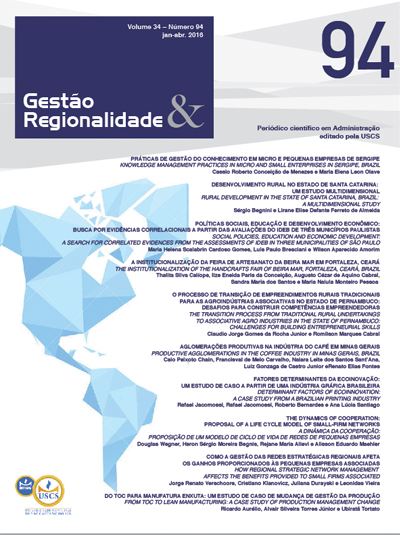The institutionalization of the Handcrafts Fair of Beira Mar, Fortaleza, Ceará, Brazil
DOI:
https://doi.org/10.13037/gr.vol32n94.2526Abstract
Part of Ceará’s culture for over thirty years, the Craft Fair of Beira Mar has increasingly emerged in national and international levels, having gone through changes of several orders. Thus, this research aims to analyze the process of institutionalization of the Craft Fair of Beira Mar in Fortaleza, Ceará, Brazil, using the model of institutionalization of Tolbert and Zucker (1998) process, which consists of three phases: habitualization, objectification and sedimentation. This is a qualitative, documentary and field research, with semi-structured interviews being held with 29 stallholders and analyzed through content analysis technique. The results showed that the main factor that motivated the emergence of the fair was of economic nature, since it sought for a way to survive, with the stallholders being the main actors in this process. The fair is in the stage of sedimentation and the normative isomorphism predominates, followed by coercive isomorphism.Downloads
Download data is not yet available.
Downloads
Published
2016-03-29
How to Cite
Calíope, T. S., Conceição, I. E. P. da, Cabral, A. C. de A., Santos, S. M. dos, & Pessoa, M. N. M. (2016). The institutionalization of the Handcrafts Fair of Beira Mar, Fortaleza, Ceará, Brazil. Gestão & Regionalidade, 32(94). https://doi.org/10.13037/gr.vol32n94.2526
Issue
Section
Articles
License
Autores que publicam nesta revista concordam com os seguintes termos:
- Autores mantém os direitos autorais e concedem à revista o direito de primeira publicação, com o trabalho simultaneamente licenciado sob a https://creativecommons.org/
licenses/by-nc-nd/4.0/, permitindo o compartilhamento do trabalho com reconhecimento da autoria do trabalho e publicação inicial nesta revista. - Autores têm autorização para assumir contratos adicionais separadamente, para distribuição não-exclusiva da versão do trabalho publicada nesta revista (ex.: publicar em repositório institucional ou como capítulo de livro), com reconhecimento de autoria e publicação inicial nesta revista.
- Autores têm permissão e são estimulados a publicar e distribuir seu trabalho online (ex.: em repositórios institucionais ou na sua página pessoal) a qualquer ponto antes ou durante o processo editorial, já que isso pode gerar alterações produtivas, bem como aumentar o impacto e a citação do trabalho publicado (Veja O Efeito do Acesso Livre).





















